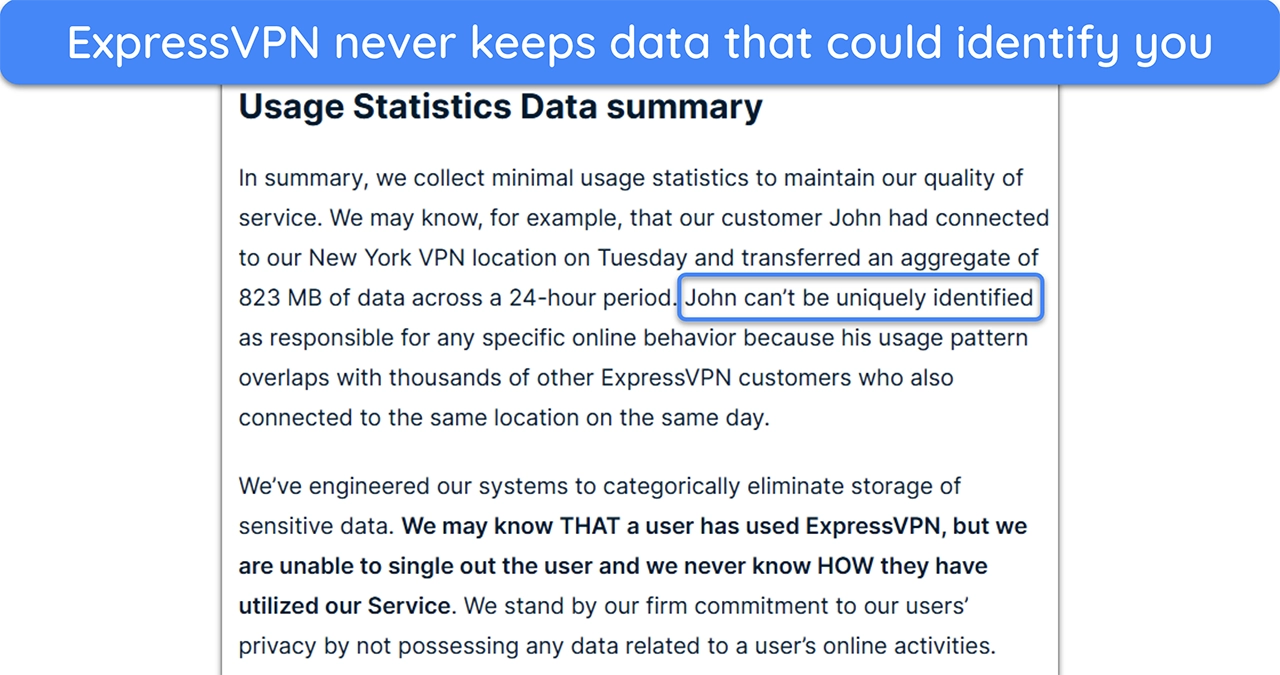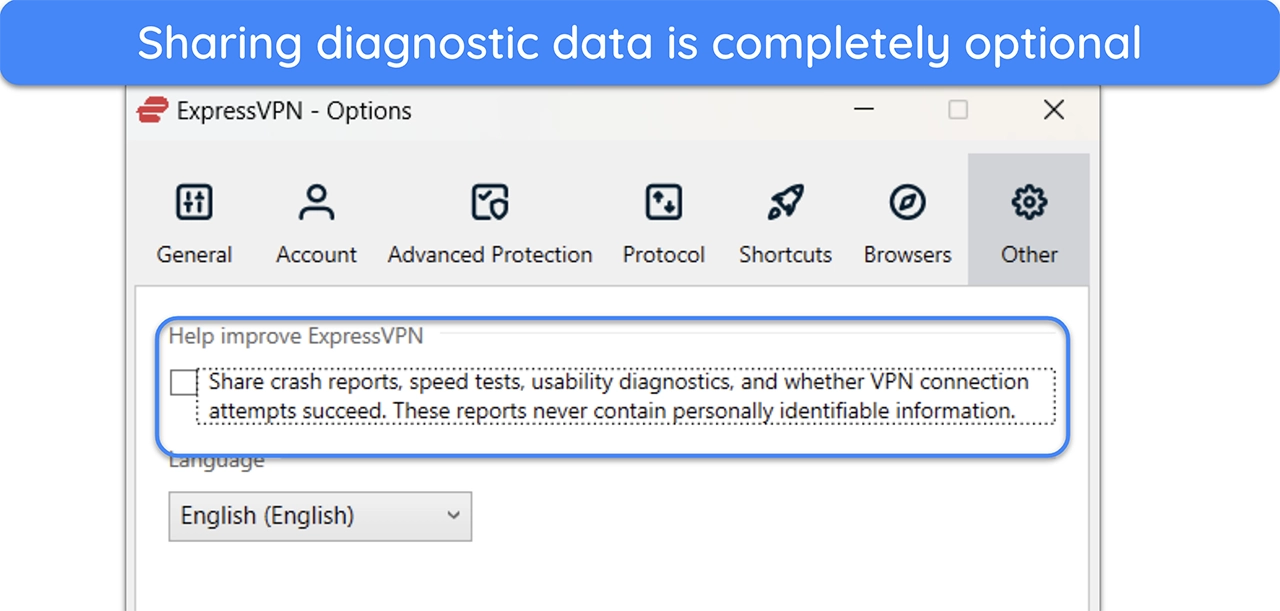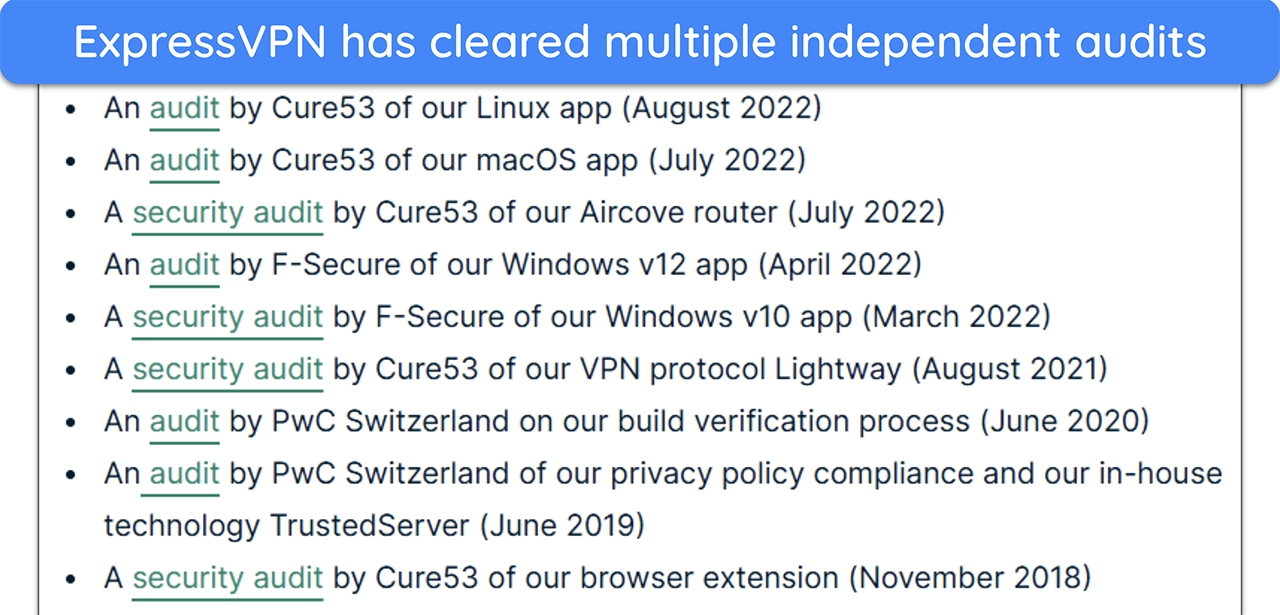Does ExpressVPN Keep Logs in 2025? No-Logs Policy Analysis
ExpressVPN claims it has a ‘strict’ no-logs policy and never stores any identifying user information or activity logs on its servers. However, is this truly the case? I did a deep dive into ExpressVPN’s privacy policy to learn whether it lives up to its claim of being a ‘no-log’ VPN.
After a thorough investigation, I found that ExpressVPN’s claims are accurate. It never stores any information that could be traced back to you. Plus, its apps, TrustedServer technology, and other aspects have been independently audited over the years, giving me further confidence in ExpressVPN’s approach to privacy. Editor’s Note: We value our relationship with our readers, and we strive to earn your trust through transparency and integrity. We are in the same ownership group as some of the industry-leading products reviewed on this site: ExpressVPN, Cyberghost, Private Internet Access, and Intego. However, this does not affect our review process, as we adhere to a strict testing methodology.
Quick Summary: Does ExpressVPN Keep Logs?
After a full analysis, I found that ExpressVPN does not keep logs of any identifying information. It doesn’t store IP addresses, browsing history, metadata, DNS queries, or anything else that could be traced back to you.
The app stores some information, like how long someone used it and what servers they are connected to. However, none of this information can be used to single out a particular user, meaning your privacy is always protected.
Pro Tip: Always Stay Anonymous With a Top VPN
A VPN with an ironclad no-logs policy ensures you stay anonymous. Since the top VPNs don’t store any information that can be traced back to you, like browsing activity and IP addresses, they’re the best tools for protecting your privacy online. Plus, these apps encrypt your traffic, meaning hackers spying on your activity can’t ever see what you’re doing.
Detailed Analysis of ExpressVPN’s No-Logs Policy
ExpressVPN’s no-logs policy states it never keeps identifying information, which is correct. The app never stores activity logs, connection logs, user IP addresses, or any other details that may be used to trace any online activity back to you.
At most, the app retains some usage data, like how long someone was connected to a server and what server they used. However, since there’s no personally identifying information tied to this data, it can’t ever pinpoint a certain user.
It’s worth noting that ExpressVPN can also store diagnostic data (like crash reports, successful connection attempts, speed tests, and usability diagnostics) to help improve its services in the future. This diagnostic data is anonymized and handled by Sentry, Google Analytics, and Firebase Crashlytics.
Note that sharing diagnostic data is optional. Even though it’ll never contain personally identifiable information, you can choose not to share diagnostic data through a simple toggle in the app’s settings.
ExpressVPN has also been independently audited multiple times, meaning you don’t have to take the company’s promises at their word. ExpressVPN has cleared various independent audits, including those from renowned companies like KPMG and Cure53. There have been audits for the VPN’s apps, proprietary Lightway protocol, and privacy compliance, and each one has validated ExpressVPN’s claims.
Note that some information is stored when you contact ExpressVPN’s support, which uses Zendesk and TeamSupport for correspondence. They may store information like your email address, the country you’re contacting from, and your device’s operating system. However, Zendesk and TeamSupport use industry-standard security practices and SSL encryption, ensuring this data is always stored safely.
TrustedServer Technology — Data Is Wiped Clean With Every Reboot
TrustedServer technology consists of RAM-based servers without long-term storage, and it’s one of ExpressVPN’s standout features. Whenever ExpressVPN servers store data, they write it to RAM instead of a traditional hard drive. Since RAM requires power to store data, all of ExpressVPN’s servers are wiped clean with every reboot.
TrustedServer ensures data cannot remain on ExpressVPN servers. Additionally, it prevents hacking attempts. If hackers somehow breached servers with traditional hard drives, they could leave a backdoor that would give them consistent access to all data. However, the RAM-based servers mean that a backdoor like this wouldn’t remain, and the server would return to its fully secure state after a single reboot.
Why It’s Important to Get a No-Log VPN
Getting a no-log VPN is critical to staying safe and anonymous online. Otherwise, government authorities can compel VPN providers to share your activity logs with them. Additionally, hackers could severely compromise your privacy if they somehow access a VPN’s servers and acquire data about your online activity.
Some VPN providers even sell data, meaning anyone who gets it could trace the activity back to you. Using a no-log VPN ensures that there’s never any information in a VPN’s servers that could lead back to you, even if the servers are compromised.
Of course, many VPNs claim to store no logs, so it’s worth getting one that has actually verified its claims. For instance, ExpressVPN has repeatedly proven that it doesn’t keep any identifying activity logs.
Alongside the various audits, ExpressVPN’s no-logs policy was tested when Turkish authorities seized one of its servers in 2017 as part of an ongoing investigation. However, authorities couldn’t recover any identifying information from the server, proving that the VPN never stores any information that could be traced back to you.
Privacy-Friendly Jurisdiction: ExpressVPN Isn’t Required to Keep User Data
Being based in a privacy-friendly jurisdiction ensures government agencies never compel a VPN to share data. Thankfully, ExpressVPN is based in the British Virgin Islands, where no data retention laws exist. It’s also not part of the 5/9/14 Eyes Alliance, an intelligence-sharing network where participating countries share information about their citizens.
Other countries can’t compel a company in this region to produce customer records either. If a government wishes to request records for a company, it must petition the British Virgin Islands High Court for a court order. Acquiring this court order is a lengthy process with little chance of success, meaning most authorities won’t follow up.
Staying Anonymous When Using ExpressVPN’s MediaStreamer
MediaStreamer is ExpressVPN’s solution for platforms without native app support, like some smart TVs and gaming consoles. However, the downside to using MediaStreamer is that you must register your IP address with ExpressVPN since this feature doesn’t have username/password authorization.
With this in mind, MediaStreamer isn’t necessarily the best option if privacy is critical. Thankfully, there’s a workaround. You can easily install ExpressVPN onto your router and then connect devices like smart TVs and gaming consoles to this router. This ensures you can use ExpressVPN without revealing your IP address on devices that don’t have native VPN apps.
FAQs on ExpressVPN’s Logging Policy
Will I be anonymous when using ExpressVPN?
What user data does ExpressVPN keep?
What does ExpressVPN’s TrustedServer Technology do?
What’s the difference between activity and connection logs?
Will ExpressVPN sell my data?
Does ExpressVPN Keep Any Identifying Information? It Does Not
In conclusion, ExpressVPN is a trustworthy VPN that lives up to its no-logs policy. It never keeps any identifying information on its servers, ensuring you always remain anonymous while using it. The only information it stores is some usage data, which isn’t linked to your identity, and diagnostics data, which you can choose not to share.
Best of all, you can try ExpressVPN risk-free. It comes with a 30*-day money-back guarantee, giving you lots of time to see if it suits you. If you’re unsatisfied with its performance, you can contact support and ask for a full refund.
Editor’s Note: Transparency is one of our core values at WizCase, so you should know we are in the same ownership group as ExpressVPN. However, this does not affect our review process, as we adhere to a strict testing methodology.
*Please note that ExpressVPN’s generous money-back guarantee applies to first-time customers only.
Summary — The Best No-Log VPNs in 2025
Editor's Note: We value our relationship with our readers, and we strive to earn your trust through transparency and integrity. We are in the same ownership group as some of the industry-leading products reviewed on this site: ExpressVPN, Cyberghost, Private Internet Access, and Intego. However, this does not affect our review process, as we adhere to a strict testing methodology.









Leave a Comment
Cancel